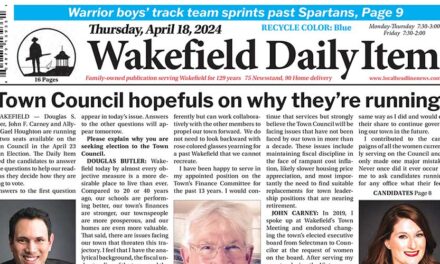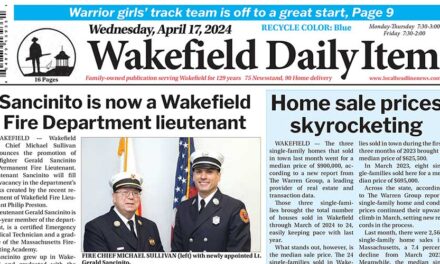Published in the January 13, 2020 edition.
By MARK SARDELLA
WAKEFIELD — You would have been hard-pressed to find much disagreement among the three Democratic candidates running for State Representative as they outlined their positions during a forum hosted by the Wakefield Democratic Town Committee last Wednesday night at Brightview Senior Living in Wakefield.
Mat Helman of Malden, Kate Lipper-Garabedian of Melrose and Ann McGonigle Santos of Wakefield are running to fill the remainder Paul Brodeur’s term as 32nd Middlesex District State Representative. Brodeur resigned the seat after he was elected Mayor of Melrose last November. A Primary Election is set for Feb. 4, with a Special Election on March 3. No Republican filed papers so there will be no GOP candidate on the March 3 ballot. Brandon Reid of Melrose has announced his intention to mount a write-in campaign. To retain the seat, the successful candidate would need to run again in the September primary and November general election.
The 32nd Middlesex District includes all of Melrose, precincts 4, 5 and 6 in Wakefield and Ward 5, Precinct 2 in Malden.
At last Wednesday’s WDTC forum, the candidates were asked to provide opening statements on their backgrounds and key positions. Questions from the audience followed.
Helman, a current Malden resident and a former resident of Melrose, spent four years working in the office of State Sen. Jason Lewis. He has also worked at the Statehouse for Sen. Karen Spilka of Ashland and State Rep. Ruth Balser of Newton. He has worked at the Massachusetts Budget and Policy Center as well as on the campaigns of a number of prominent Democrats.
He said that as a progressive, he believes that state government can be instrumental in solving problems. However, he said, state government currently “doesn’t work as well as it could for citizens.”
He said that the current Speaker of the House, Robert DeLeo, troubles him.
“We need systemic overhaul in leadership at the State House,” he said, noting that the previous three speakers were all convicted felons.
Another priority should be transportation, Helman said. He called upon the MBTA to look at other transit systems around the country to see what works well.
He also voiced support for expanded abortion rights. “We need to pass the ROE act immediately to be an example to the other 49 states in the country,” he said.
Helman called for passage of the “Fair Share Amendment,” which would create an additional tax on annual incomes above $1 million.
Lipper-Garabedian is an attorney in state government and currently serves as a Melrose City Councilor. She said that she “believes passionately in the power the government has in improving the lives of individuals and their families.”
As State Representative, she said that she would apply her skill set as an attorney and an advocate to “looking at the big complicated issues that are so critical for our communities and the Commonwealth.” Those issues, she said, would include public education, the climate crisis and the state budget.
Lipper-Garabedian said that her background as an attorney with the state Executive Office of Education would allow her to “hit the ground running” in the State Legislature, especially with issues related to education. She pledged to do a regular newsletter as State Rep to inform constituents. She also vowed to be “accessible, responsive and incredibly effective” on Beacon Hill.
Ann McGonigle Santos is currently Assistant Dean of Students at Suffolk University School of Law. She has been a Wakefield Town Councilor for seven years. Prior to that she served as an elected member of the Wakefield Board of Health. Santos said that she was “vested in the community,” noting that Melrose is not that different from Wakefield, where she grew up and attended public schools.
“We are all committed progressive Democrats,” Santos said of herself and her two opponents.
She touted Wakefield’s sound fiscal status during her tenure on the Town Council. She noted that she supported building the new Galvin Middle School and has participated in negotiating contracts. She said that she would bring to the office of State Representative her ability to connect with people and to listen. She cited her experience as a prosecutor with the Middlesex County District Attorney’s Office as evidence of her ability to “go to the mat for folks.”
Santos said that she strongly supports the ROE act, which would expand access to abortion. “The fact that it would be at risk in 2020 is absolutely terrifying to me,” she said.
With respect to transportation, she observed that Massachusetts is at risk of losing business opportunity due to the state of its transportation system. “We have to shake the system up,” she said.
Greg Liakos posed the first question to the candidates, asking how each would reconcile the needs of constituents vs. the demands of Beacon Hill leadership.
Lipper-Garabedian said that she had experience navigating such dynamics. She said that she knows how to compromise but also knows how to put her foot down in critical situations.
Helman said that “the integrity move is always the right move” and he would run against Speaker DeLeo’s management of the House. He said that he was “willing to take it on the chin” to stand up for a more functional state government.
Santos said that you cannot compromise your principles. “You have to talk to people you disagree with and push back,” she said. “I’ve had success with people like the Speaker. I’m very comfortable in that setting.”
Dan Benjamin asked the candidates what they would do for the senior, disabled and veteran communities.
Santos said that one thing that might be necessary is an ADA audit to make the commuter rail accessible. She noted that Wakefield has talked about different tax structures for seniors. Wakefield has undertaken a larger outreach to veterans and stressed the need to make health care accessible to veterans.
Helman cited what he called the “need to make communities more senior-friendly across the board,” and for officials to collaborate on how communities will develop as the population ages.
Lipper-Garabdian talked about the need for seniors to be able to safely access public transportation. She stressed the need for housing affordability so that people can age in place and cited the need to retrofit housing to make it more energy efficient for seniors. She also called for making sure that statutes related to veterans are up to date.
Bob Mitchell asked about House Bill 1280, the so call Housing Choice Act, which would reduce to a simple majority the current two-thirds majority voting threshold for a number of housing-related zoning changes at the local level. All three candidates admitted that they were not well enough versed on the measure to offer an informed opinion.
The candidates also agreed on the need to pass legislation to expand end-of-life options and allow doctors and patients to bring life to a close under certain circumstances.
All three candidates also pledged that if they were not the successful candidate in the special election they would not run again in the September Primary.




